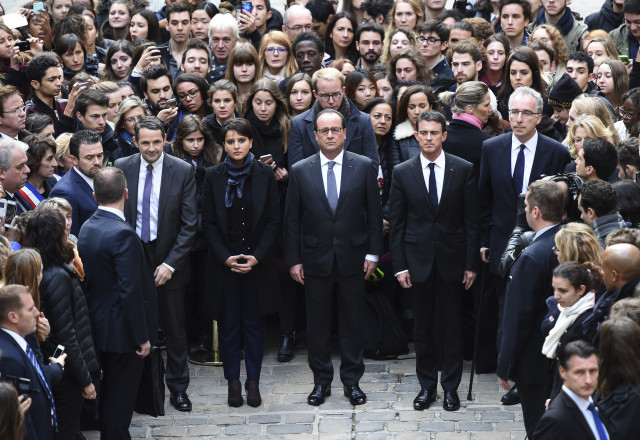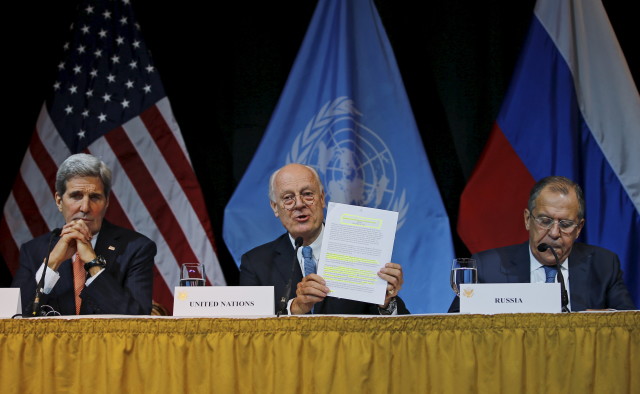By Barbara Slavin
Among the most unhelpful suggestions in the aftermath of the terrorist attacks in Paris was Republican Mike Huckabee’s proposal that President Barack Obama cancel the recently signed nuclear agreement with Iran.
Huckabee’s reasoning: “Radical Islamists, whether Sunni or Shia, are a clear and present danger to civilization.”
Never mind that Iran is among the few nations sending ground troops to fight the group that calls itself the Islamic State (IS).

(From L) French Minister for Higher Education and Research Thierry Mandon, French Education Minister Najat Vallaud-Belkacem, French President Francois Hollande and French Prime Minister Manuel Valls observe a minute of silence at the Sorbonne University in Paris to pay tribute to victims of Friday’s Paris attacks, France, November 16, 2015. REUTERS
Indeed, U.S. Defense Secretary Ashton Carter, speaking before the IS slaughter of innocents in Paris, complimented the Iranians, telling journalist Jeffrey Goldberg ““We don’t like it that they’re in the game on the ground, but they are in the game” in Syria, Iraq, Yemen and Lebanon.
On the other hand, U.S. Arab allies that are part of the U.S.-led anti-IS coalition “have weighted having high-end air-force fighter jets and so forth over the hard business of training and disciplining ground forces and special-operations forces,” Carter said.
Combatting IS successfully is going to require the maximum possible international cooperation among the world’s nation states. That means working with Arabs, Europeans, Russians, Turks and yes, Shiite Iran.
After Paris, the downing of a Russian plane over Sinai and mass fatality explosions in Turkey and Lebanon in the space of just a few weeks, it is now obvious that IS has not been “contained” – as President Obama has repeatedly asserted – and has spread beyond the failed states of the Middle East.
Frustrated that their advances have stalled in Iraq and Syria, the group has morphed into something closer to the old al-Qaida and is now attacking both the “near enemy” of autocratic Middle Eastern regimes and the “far enemy” of Western civilization. The terrorists’ apparent goals include revenge for losses in the Levant as well as a desire to deepen bigotry and sectarian hatred to increase recruitment and convince Muslims they have no place outside a reconstituted “caliphate.”
In the aftermath of the Paris attacks, the first priority should be to improve intelligence about those already radicalized and living in our midst. The U.S. and its allies should also continue to target IS leaders in the Middle East.
Iran, with experience dealing with al-Qaida and knowledge of the Iraqi ex-Baathist officers who figure prominently in IS, is a potential source of information. Indeed, it indirectly assisted the U.S. in 2001 in toppling the Taliban government of Afghanistan, caught and deported many members of al-Qaida and could have done more if then President George W. Bush had not lumped Iran with Iraq and North Korea on an “axis of evil.
It is unfortunate if understandable that Iranian President Hassan Rouhani cancelled a planned trip to Europe this week. Hopefully, that trip will be rescheduled and include a security component.
Another crucial element in the anti-IS strategy is a redoubled search for political solutions in Libya, Yemen and especially Syria, where the brutality of President Bashar al-Assad laid the ground for IS to spread.

U.S. Secretary of State John Kerry (L), Russian Foreign Minister Sergei Lavrov (R) and UN Envoy for Syria Staffan de Mistura address the media in Vienna, Austria, November 14, 2015. Parties agreed to accelerate efforts to end the conflict in Syria by launching negotiations between the government and opposition by January. REUTERS
Over the weekend, 19 nations meeting in Vienna – including Iran, Russia, Turkey and Saudi Arabia — approved a timetable for a Syria agreement. Diplomats avoided the toughest questions about the fate of Assad and his top henchmen but launched a process of identifying and uniting responsible Sunni opposition to his rule.
In the meantime, the war against the Islamic State is intensifying.
Despite an understandable aversion to getting sucked into another major conflict in the Middle East, the Obama administration has increased its military presence in Iraq and Syria and is keeping thousands of troops in Afghanistan. The U.S. is also bolstering support for Iraqi and Syrian Kurds who have proven to be the most reliable and effective forces in pushing back IS.
While terrorists were mowing down ordinary Parisians on Friday, Kurdish Peshmerga, with the assistance of American air power, were retaking the town of Sinjar and cutting the main highway linking IS strongholds in Iraq and Syria.
Iraqi forces trained by the U.S. have encircled Ramadi, while Kurdish forces in Syria are preparing to attack the IS “capital” of Raqqa. France on Sunday unleashed a barrage of bombs on that Syrian town.
A U.S.-led coalition is bombing oil fields that are funding IS and hitting trucks carrying that oil to market. And a U.S. drone strike killed “Jihadi John” – a Kuwaiti-born British terrorist best known for lopping off the heads of foreign hostages and posting the videos on social media.
While stepping up attacks on IS at its source, Europe, the United States and wealthy Arab countries must continue to take in refugees from Syria, Iraq and Afghanistan – the vast majority of whom are fleeing terror and not plotting it.
A number of right-wing European politicians and Republican presidential candidates in the United States have called for closing borders to these desperate asylum seekers. U.S. presidential contenders Jeb Bush and Ted Cruz said Sunday that the U.S. should only accept Christians – a small percentage of those fleeing carnage in the Middle East.
These sorts of comments only provide grist for IS propaganda about Western hostility toward Muslims. Closing borders cannot protect countries from terrorists who hold Western passports – as appears to have been the case for most of the Paris attackers – or who have easy access to firearms, as is the situation in the United States.
The West must also increase economic and development aid to countries such as Tunisia, the only Middle Eastern nation to have survived the Arab spring with an inclusive democratic government.
Ultimately, the destruction of IS is primarily the responsibility of Muslim leaders with the courage to confront the group as a perversion of one of the world’s great religions. Religious authorities in Saudi Arabia, Egypt and Turkey should make it clear through sermons and fatwas that those who kill innocents will never see paradise.
Demonizing an entire faith – as too many U.S. and European politicians appear all too ready to do – will only serve the interests of the terrorists. Ultimately these death-eaters – to paraphrase J.K. Rowling – will lose if the world is united against them.

